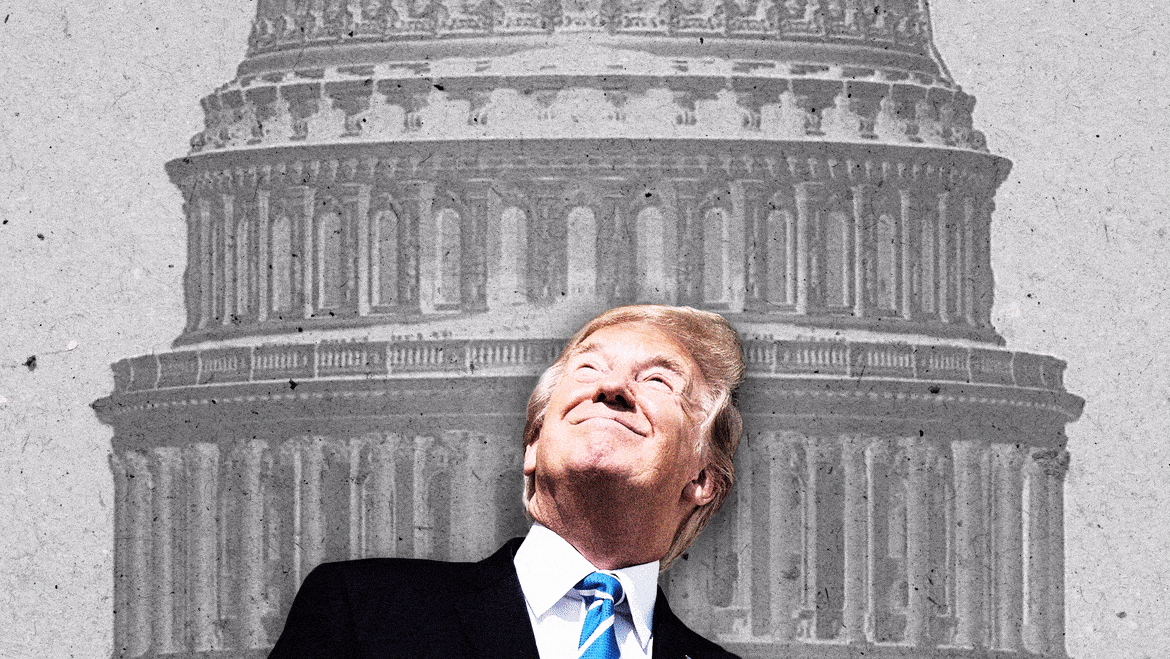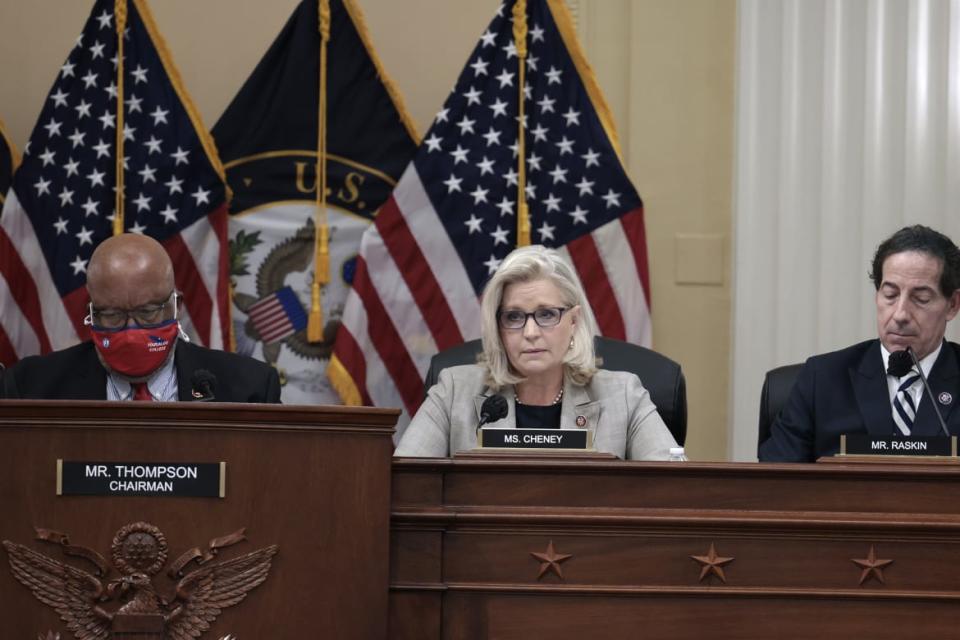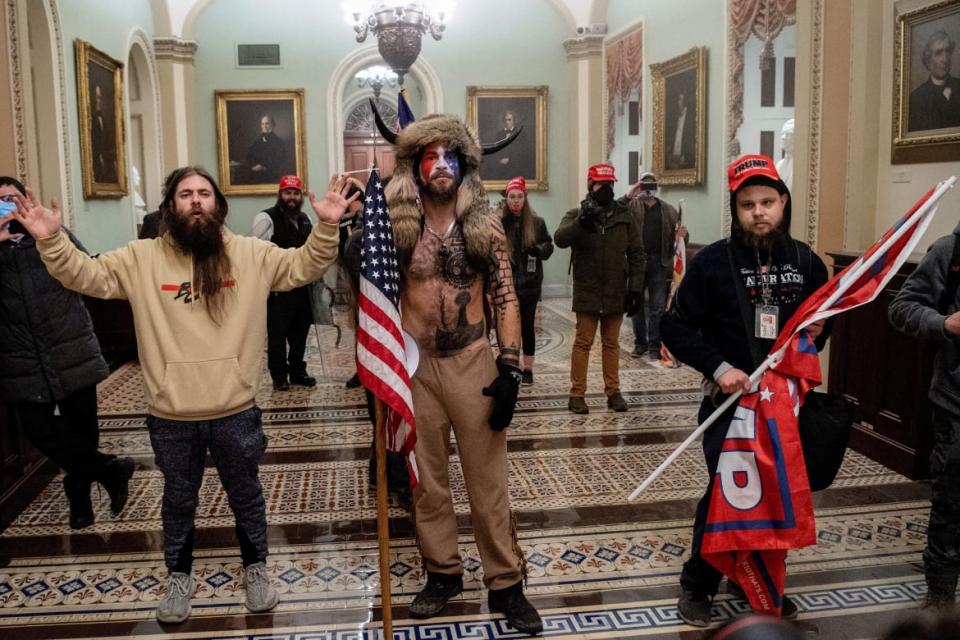The Obscure Charge Jan. 6 Investigators Are Looking at for Trump

- Oops!Something went wrong.Please try again later.
As federal prosecutors increasingly use an obscure criminal charge to jail Jan. 6 insurrectionists, congressional investigators seem to be building a case that could result in that same charge against former President Donald Trump.
A third of the 700 people arrested by the Justice Department for attacking the U.S. Capitol building have been hit with a peculiar federal “witness tampering” law, according to researchers at George Washington University’s Program on Extremism. Those 240 insurrectionists have been charged with corruptly obstructing an official proceeding, a never-before-seen tactic by prosecutors for an equally unprecedented event.
So far, 13 have pleaded guilty, and three of those have already been sentenced. But if hundreds of people face prison time for interrupting Congress while it was certifying the 2020 election results, what happens to the president who ordered them to march there?
Jan. 6 Panel Asks Jim Jordan for His Texts With Trump
While the DOJ pursues the rioters, the special House Jan. 6 Committee is separately collecting evidence to formulate a picture about how this all came together. And legal scholars say a strategy is taking shape—one that builds a case to criminally charge the former president.
“The DOJ and the committee are building a pyramid of guilt to get to the top. The more people who plead guilty, the more the top of the pyramid begins to take shape,” said Joshua E. Kastenberg, a professor at University of New Mexico’s law school.
Rep. Liz Cheney (R-WY), one of the two GOP members on the congressional panel investigating the insurrection, first drew attention to that possibility during a televised hearing last week. That’s when she made an obscure reference to “another key question before this committee: Did Donald Trump, through action or inaction, corruptly seek to obstruct or impede Congress’ official proceeding to count electoral votes?”
On Monday, The New York Times pushed that idea further when it revealed that the House committee investigating the insurrection is considering referring Trump to the Justice Department.
A source close to the committee told The Daily Beast that Cheney is an experienced attorney, and she was being deliberate when she raised the question that night.
“Her choice to use that language was not an accident,” the source said.
David Schultz, a law professor at the University of Minnesota, said congressional investigators could be building a case that Trump “aided and abetted” the rioters to interrupt the vote count. And Cheney’s statements, combined with the Justice Department’s aggressive use of this federal charge, hint at what might come.
Trump Switches Gears Again, Suggests Jan. 6 Was False Flag Op
“We are seeing a pattern of establishing an obstruction of justice that takes it up the food chain,” he said.
Cheney knows the committee can’t, on its own, charge anyone with a crime. But its findings can certainly result in Congress asking the Justice Department to pursue a case against the former president.
Trump’s representatives did not respond to an inquiry on Tuesday, but the former president in the past has repeatedly berated the committee’s work as illegitimate. Staff on the bipartisan Jan. 6 Committee declined to comment on the subject. And the U.S. Attorney’s Office for the District of Columbia declined to speak about their ongoing cases.

Rep. Liz Cheney (R-WY), vice-chair of the select committee investigating the January 6 attack on the Capitol, speaks during a business meeting on Capitol Hill on Dec. 13, 2021.
It might seem odd for a federal law against witness tampering to be used this way, but the statute includes a provision that makes it a crime for anyone who “corruptly… obstructs, influences, or impedes any official proceeding,” or tries to do so.
As insurrection cases make their way through federal courts in the District of Columbia, judges are increasingly allowing prosecutors to use it.
Ronald Sandlin and Nathaniel DeGrave, accused rioters who were caught in Las Vegas, recently tried to stop the DOJ from using it against them. That effort was promptly cut short by U.S. District Court Judge Dabney L. Friedrich, a Trump appointee, when she issued an opinion on Dec. 10 that noted how Sandlin recorded a livestream shortly before the attack in which he said, “freedom is paid for with blood” and “there is going to be violence.”
Friedrich ruled that it’s appropriate for the feds to pursue these charges, because the dynamic duo’s alleged conduct—gearing up with pistols, knives, and walkie talkies and then storming the Capitol—“fall on the obviously unlawful side of the line.”
“And it was allegedly done with the intent to obstruct the congressional proceeding,” Friedrich wrote.

Supporters of President Donald Trump storm the Capitol on Jan. 6, 2021.
“This is a really a novel application of this law,” said Jonathan Lewis, a research fellow at GWU’s Program on Extremism who has been closely tracking the hundreds of insurrection cases.
“We’ve seen a number of legal challenges to 18 U.S.C. 1512(c)(2) saying this wasn’t an official proceeding. Or saying this was a political use of a U.S. code in an improper way,” he told The Daily Beast.
Then again, legal scholars concede, this is also the first time hundreds of people stormed into the meeting place of the nation’s Congress.
It worked against Paul Hodgkins, a Florida man who carried a Trump flag onto the Senate floor and got slapped with eight months in prison. Two others, “QAnon Shaman” Jacob Chansley and gym owner Scott Fairlamb, were sentenced to 41 months behind bars. Eight others have already pleaded guilty and await sentencing in the next year.
“One of the most commonly used defenses by January 6 defense attorneys is that their client could not have been intentionally obstructing the proceeding because they had no idea it was an official proceeding,” Lewis said.
But that defense has an obvious weakness: rioters were expressly there to “stop the steal” by preventing Congress from certifying the 2020 election results.
“They were there to interfere with the process. They may not have been there to commit acts of violence or commit an insurrection. But they were absolutely there to do exactly what this statute covers,” Kastenberg told The Daily Beast.
Deposed Jan. 6 Rally Organizer Predicts Trump Will Be Subpoenaed By Committee
The more defendants plead guilty to this charge, the more they establish it as the norm. And prosecutors have established this pattern before.
“This is how you prosecute the mob. You don’t start at the top,” said Vermont Law School professor Jared Carter.
Going after Trump himself, however, is another matter.
Legal scholars said for this charge to work, prosecutors would have to find that Trump rebuffed his advisers’ pleas that he intervene and redirect the crowd—because he explicitly intended for the attack to happen. Or that he held back the National Guard or federal law enforcement forces from coming to the rescue.
This might be what Cheney means by “inaction” on Trump’s part, said Rachel E. VanLandingham, a professor at Southwestern Law School in Los Angeles who spent years as a lawyer in the military.
“It’s going to be really hard to pin criminal liability on the president on this ‘obstruction of justice’ statute, especially when he has wide discretion as president in employing military force domestically,” said VanLandingham, who noted that “criminal law isn’t for bad judgment calls.”
As for Trump’s speech to protestors, where he told them to march to the Capitol and “fight like hell,” VanLandingham said it just wouldn’t be enough.
“This is so tied up with political speech. One could make an incredible argument that President Trump was inciting lawlessness. And there’s a strong argument he was aiding and abetting the obstruction of proceedings. But that has to be weighed against the core constitutional value that animates the First Amendment: the ability to engage in fiery, incendiary rhetoric. And the balance has to be tilted in favor of protecting that speech,” she said.
Get our top stories in your inbox every day. Sign up now!
Daily Beast Membership: Beast Inside goes deeper on the stories that matter to you. Learn more.

